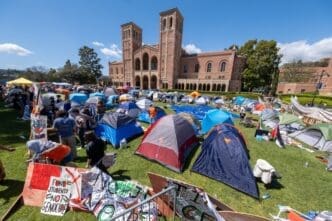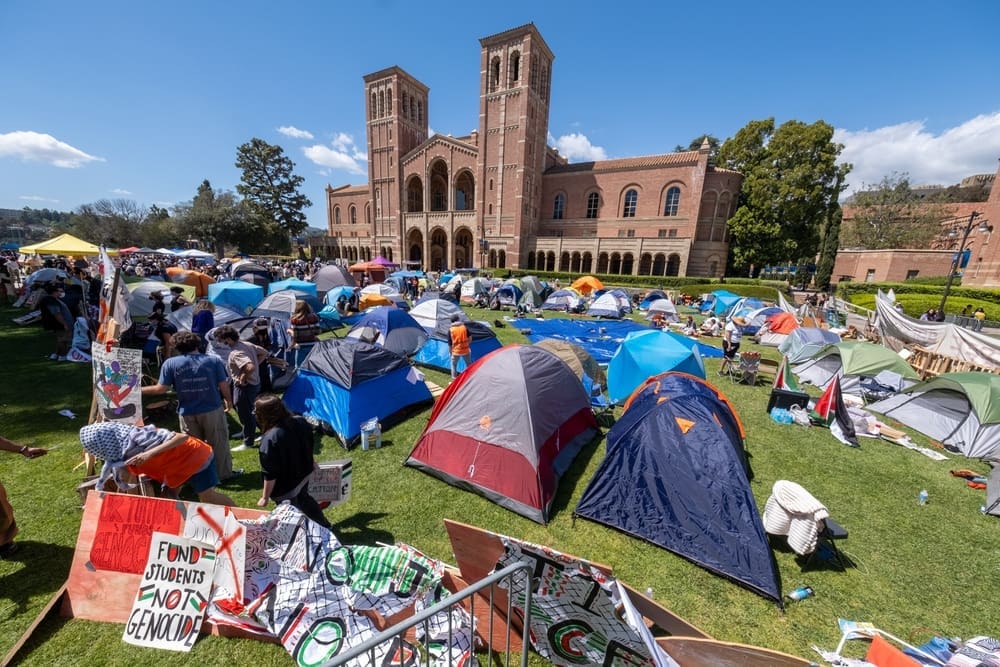University professors and students across the United States organized protests on Thursday, voicing opposition to what they perceive as widespread attacks on higher education. These concerns include significant reductions in funding, the expulsion of international students, and restrictions on free speech related to the conflict in Gaza. Demonstrations took place at various institutions, including Harvard University, where the administration of President Donald Trump announced plans to freeze $2.2 billion in grants and contracts and threatened the university’s ability to host international students.
Harvard graduate student Rochelle Sun, studying in the Department of Government, emphasized the importance of international students in enhancing the university’s mission of advancing human knowledge. She expressed concern that the absence of these students would hinder her academic goals. During the protest in Cambridge, Massachusetts, Sun carried a sign reading, “I should be writing my dissertation, but I keep having to fight this stupid fascism.”
Professor Nancy Krieger from Harvard’s School of Public Health addressed the crowd, highlighting the detrimental impact of funding cuts on essential programs for medical research and public health monitoring. Krieger noted that her grant from the National Institutes of Health was terminated due to its focus on discrimination in health, a type of research unlikely to receive funding from private sources. She stressed the importance of federal support for research, academic work, and training future generations to protect public health.
The Trump administration has increasingly targeted federal funding at higher education institutions as a means to enforce its political agenda. This unprecedented approach has aimed at influencing college campuses by threatening and pausing funding for top U.S. universities. On the campaign trail, Trump pledged to cut funds for schools promoting “critical race theory, transgender insanity, and other inappropriate racial, sexual, or political content.”
Republican officials have scrutinized universities where Palestinian protests occurred amid the conflict in Gaza last year, and several Ivy League presidents have testified before Congress regarding allegations of antisemitism. The administration has accused protesters of being “pro-Hamas,” referencing the Palestinian militant group responsible for the October 7, 2023, attack on Israel. Protesters, however, clarified that their demonstrations were against Israel’s actions in the conflict.
This year, the U.S. government has exercised its immigration powers to target international students and scholars participating in pro-Palestinian demonstrations or criticizing Israel’s military actions in Gaza. Some have faced deportation or detention, while others fled the country after learning their visas were revoked. Ronald Cox, a political science professor at Florida International University in Miami, highlighted the fear among international students, who face uncertainty about their status and the possibility of deportation without due process.
Harvard’s protest occurred shortly after the university publicly opposed the Trump administration’s demands to limit campus activism, framing these demands as a threat to university autonomy previously upheld by the Supreme Court. At the University of California-Berkeley, approximately 450 protesters gathered, where emeritus professor and former Labor Secretary Robert Reich criticized attempts to placate the administration, asserting that “you cannot appease a tyrant.”
Columbia University in New York initially complied with some of the Trump administration’s demands but later took a firmer stance, stating that certain demands were “not subject to negotiation.” Around 150 protesters rallied at Columbia, which had been the site of major pro-Palestinian protests the previous year. Demonstrators held signs with slogans such as “stop the war on universities” and “censorship is the weapon of fascists.”
The protests were organized by the Coalition for Action in Higher Education, which comprises groups like Higher Education Labor United and the American Federation of Teachers. Kelly Benjamin, spokesperson for the American Association of University Professors, argued that the administration’s efforts to undermine academia are fundamentally anti-American. She emphasized that college campuses have historically been spaces for robust debate and dissent, vital to the health of democracy, and the administration’s actions threaten to dismantle this tradition.














